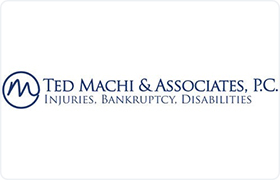Southlake Bankruptcy & Debt Lawyer, Texas
Sponsored Law Firm
-
 x
x

Click For More Info:
-
Machi & Associates, P.C.
1521 North Cooper Street Suite 550 Arlington, TX 76011» view mapAccident & Injury, Bankruptcy, Social Secuirty We Fight So You Don't Have To
Our professional team of attorneys and staff provide the experience and expertise needed to effectively handle your case.
800-804-0771
Alvin Quincey Malone
✓ VERIFIEDEstate, Divorce & Family Law, Bankruptcy & Debt, Military, Bankruptcy
Al Malone left a career as a tax advisor at one of the largest and most respected companies in the world to establish a firm dedicated to helping comm... (more)
Kathy E. Roux
Estate Planning, Elder Law, Family Law, Consumer Bankruptcy, Estate
Status: In Good Standing Licensed: 31 Years
Christopher James Anderson
International Other, Intellectual Property, Business & Trade, Consumer Bankruptcy
Status: In Good Standing Licensed: 48 Years
Christopher J. Anderson
International Other, Intellectual Property, Business & Trade, Consumer Bankruptcy
Status: In Good Standing Licensed: 48 Years
Richard Michael Kilgore
Estate Planning, Construction, Consumer Bankruptcy, Business, Estate
Status: In Good Standing Licensed: 25 Years
C. D. Peebles
Employee Rights, Insurance, Credit & Debt, Personal Injury
Status: In Good Standing Licensed: 38 Years
Kathy Roux
Estate Planning, Elder Law, Family Law, Consumer Bankruptcy, Estate
Status: In Good Standing
Christopher Thomas Vickers
Litigation, Employee Rights, Business & Trade, Credit & Debt
Status: In Good Standing Licensed: 25 Years
 Ted Machi Arlington, TX
Ted Machi Arlington, TX Practice AreasExpertise
Practice AreasExpertise

